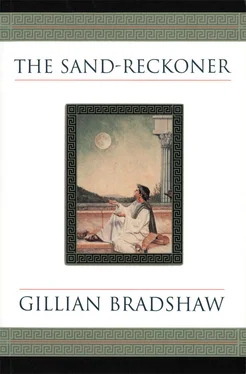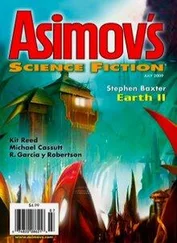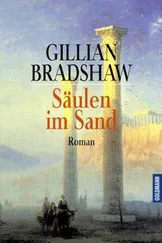Gillian Bradshaw - The Sand-Reckoner
Здесь есть возможность читать онлайн «Gillian Bradshaw - The Sand-Reckoner» весь текст электронной книги совершенно бесплатно (целиком полную версию без сокращений). В некоторых случаях можно слушать аудио, скачать через торрент в формате fb2 и присутствует краткое содержание. Жанр: Исторические приключения, на английском языке. Описание произведения, (предисловие) а так же отзывы посетителей доступны на портале библиотеки ЛибКат.
- Название:The Sand-Reckoner
- Автор:
- Жанр:
- Год:неизвестен
- ISBN:нет данных
- Рейтинг книги:3 / 5. Голосов: 1
-
Избранное:Добавить в избранное
- Отзывы:
-
Ваша оценка:
- 60
- 1
- 2
- 3
- 4
- 5
The Sand-Reckoner: краткое содержание, описание и аннотация
Предлагаем к чтению аннотацию, описание, краткое содержание или предисловие (зависит от того, что написал сам автор книги «The Sand-Reckoner»). Если вы не нашли необходимую информацию о книге — напишите в комментариях, мы постараемся отыскать её.
The Sand-Reckoner — читать онлайн бесплатно полную книгу (весь текст) целиком
Ниже представлен текст книги, разбитый по страницам. Система сохранения места последней прочитанной страницы, позволяет с удобством читать онлайн бесплатно книгу «The Sand-Reckoner», без необходимости каждый раз заново искать на чём Вы остановились. Поставьте закладку, и сможете в любой момент перейти на страницу, на которой закончили чтение.
Интервал:
Закладка:
They loaded the chest on the donkey- the donkey was unhappy about it- and confirmed that they would meet next day. Archimedes handed the torch to Marcus, and the little party clip-clopped off down the road.
"What were you shaking hands about?" Archimedes asked his slave as they turned to climb the hill to the other side of the Achradina.
Marcus gave a self-satisfied smile. "I made a bet with that soldier. Going to get back that stater you gave him."
Archimedes looked at him with concern. "I hope you don't lose your money."
"Don't worry," said Marcus, "I won't."
2
The Achradina was an old quarter. The first Greeks to colonize Syracuse had settled on the promontory of Ortygia, and Ortygia- a grand region of temples and public buildings prudently fortified and garrisoned- was still the seat of the government. The Achradina had formed early, though, when the houses and shops of the growing city overflowed the crowded citadel and sprawled messily along the shore. When the city grew again, in wealth and power, the New Town had been laid out inland for the rich, while the Tyche quarter, a straggle of buildings along the road north, had become the place of settlement for the poor. The Achradina belonged to the old middle class. Narrow-streeted and dirty, bordered by the walls which guarded the city from attack by sea, it was the heart of Syracuse- dark, crooked, and full of secret delights.
Archimedes crossed it joyfully. A city-state customarily inspired in her citizens the most intense and passionate sense of patriotism and civic pride, and though Archimedes had always been something of a misfit in his own city, still every dusty cross-roads seemed to him to be shining with the glory of Syracuse. Each step, too, took him closer to home. Eagerly he marked off each familiar landmark: the small park with its bedraggled plane trees; the baker's shop around the corner where the family had bought its bread; the public fountain with its statue of a lion, which had supplied water for the household. A scent of herbs and roast meat wafted from the cookshop down the road, where he'd often run to fetch an evening meal if for some reason one hadn't been prepared at home. Nikomachos' house; Euphanes the Butcher's shop, with his house on top of it… and finally, there it was. Archimedes stopped in the street and gazed in silence at the front of featureless mud brick and the weathered wood of the single door. His chest began to hurt and his eyes stung. At one time this house had defined what was meant by a house. It had been the only house that mattered, the center of the universe, that container for everything that was important in his small world. And it was still true that all the people he loved most were behind that door.
He wished they lived in Alexandria.
Marcus raised the torch and likewise gazed at the house, remembering the first time he'd seen it, when Phidias had led him back from the slave market in chains. Not home, he reminded himself fiercely, though uncertain why he was denying the joy that hovered at the edge of his awareness. Just the house where I am a slave. For a moment he remembered his own home in the hills of central Italy, his own parents. He shoved them quickly from his mind: probably dead now, anyway. Some of the bricks on Phidias' house were crumbling, he noted, and the roof needed retiling. Not surprising. He himself had been the only man in the household, unless you counted the masters, and you couldn't count them, not when it came to retiling roofs. The place must have been running down. He had work ahead of him.
Gelon the Baker's son, who'd come to look after his father's donkey, shuffled his feet and asked, "Is this it?"
They unloaded the donkey, set the chest down, and sent the baker's son home with his father's beast, handing the child the torch to light his way. In the soft summer darkness Archimedes took a deep breath and knocked upon the door.
There was a long silence. Archimedes knocked again, and at last the door cracked open and a woman peered anxiously out, the lines in her worn face deeply shadowed in the light of the lamp she held. "Sosibia!" cried Archimedes, breaking into an enormous smile, and the housekeeper gaped, then screamed, "Medion!" — the diminutive ending of his proper name, his family nickname, which he hadn't heard for three years.
The reunion was as noisy and as joyful as anything Archimedes had pictured to himself. His mother, Arata, came running and flung her arms around him. His sister, Philyra, seized him as soon as his mother let go. "You've grown up!" he told her, and held her at arms length to admire her. She had been thirteen when he left: now sixteen and a young woman, she had not, in fact, changed much. Still straight and thin, gawky and bright-eyed, with her unruly brown hair pulled into a knot behind her head. She knocked his hands away so she could hug him.
"You haven't!" she replied. "You're as much a mess as ever!" Sosibia and Sosibia's two children hovered grinning and exclaiming in the background. But there was an absence. "Where's Papa?" asked Archimedes, and the noise died.
"He's too ill to stand," Philyra said, into the sudden quiet. "He hasn't been able to get out of bed for months." Her voice was heavy with reproach. For months she had tended their father and watched him waste away, while Archimedes, the darling and only son, lingered in Alexandria.
Archimedes stared at her, stricken. He had known that his father was ill. For a couple of months that awareness had lurked in the back of his mind, putting a wash of anxiety over all his preparations for coming home. But despite that, he had expected to find his father much as he had left him. He would have reckoned illness to be a persistent cough, a bad back, chronic indigestion. He had not expected a deforming monster to have moved into the house and pinned his father to his bed.
"I'm sorry, my darling," said his mother gently. She had always been the family peacemaker, the voice of calm practicality. She was shorter than her children, wide-hipped, broad-browed; there was more gray in her brown hair than her son remembered. "I'm afraid it will be a great shock for you to see him. You can't have realized how ill he is. But I thank the gods you're safely home at last."
"Where is he?" asked Archimedes in a hoarse whisper.
Phidias's sickbed had been placed in the room Archimedes remembered as his mother's workroom. It was at the opposite end of the small courtyard which opened onto the street and formed the center of the house. The stairways to the bedrooms on the upper floors were steep and narrow, and a ground-floor room was much more convenient for an invalid. When Archimedes crossed to the old workroom, he found a lamp lit and his father sitting up and looking eagerly toward the door: he had heard the commotion, and was impatiently awaiting his son's appearance. Archimedes faltered on the threshold. Phidias had always been tall and thin; now he was skeletal. The whites of his eyes had turned yellow, and they stared out of deep hollows; his skin, too, was yellowish, and crumpled and dry. Most of his hair had fallen out, and what remained was white. When he stretched out his arms toward his son, his hands trembled.
Archimedes went through the door in a rush, dropped to his knees beside the bed, and threw his arms about his father's emaciated frame. "I'm sorry!" he choked. "I didn't… if I'd known…"
"Archimedion mine!" exclaimed Phidias, and folded his stick-like arms about his son. "Thank the gods you're home!"
"Oh, Papa!" cried Archimedes, and burst into tears.
In the courtyard, Marcus dragged the luggage in out of the street and shut the door. When he turned back to the house, Sosibia caught his shoulders and kissed him lightly on the cheek. "You're welcome back, too!" she said softly. "I wish it were to a happier house."
Читать дальшеИнтервал:
Закладка:
Похожие книги на «The Sand-Reckoner»
Представляем Вашему вниманию похожие книги на «The Sand-Reckoner» списком для выбора. Мы отобрали схожую по названию и смыслу литературу в надежде предоставить читателям больше вариантов отыскать новые, интересные, ещё непрочитанные произведения.
Обсуждение, отзывы о книге «The Sand-Reckoner» и просто собственные мнения читателей. Оставьте ваши комментарии, напишите, что Вы думаете о произведении, его смысле или главных героях. Укажите что конкретно понравилось, а что нет, и почему Вы так считаете.












